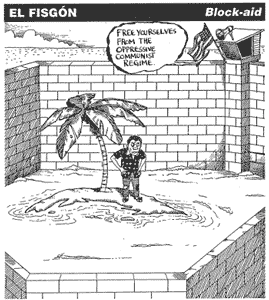|
| |

Politically and economically induced migration

Since the revolution, about 600,000 of the 11,000,000 Cuban people have
migrated to the U.S. for a variety of reasons. In the most economically impacted period of
post-revolutionary Cuba (the Special Period during the 1990s), some undertook hazardous
journeys on make-shift rafts in order to leave Cuba. Under a special mid-1990 agreement
between the US and Cuba, twenty thousand Cuban citizens are permitted to emigrate from
Cuba and enter the U.S.. Cuban citizens submit their names to a government lottery to
determine who will go.
Most of the people that left Cuba initially were families of Army
officers, government officials, or land owners. In recent years, people have migrated to
the U.S. for the same reason that other people of Latin America have--for more economic
opportunity. The U.S. embargo against Cuba has harmed the Cuban economy severely. Still,
more immigrants stream into the U.S from other Latin American countries which have normal
relations with the U.S..
The Cuban economy today
 At
first, the embargo had little effect on Cuba because the Soviet Union traded with
Cuba. In 1989, when the Soviet Union dissolved, the trade group greatly weakened the
economy in Cuba. At
first, the embargo had little effect on Cuba because the Soviet Union traded with
Cuba. In 1989, when the Soviet Union dissolved, the trade group greatly weakened the
economy in Cuba.
Currently, the economy is in a poor state, mainly because of the trade
embargo. The US has also intervened with other countries which trade with
Cuba. Consequently, Cuba has found it difficult to get its medical and other supplies
that are desperately needed.
Cuba is hoping to bring in more foreign investors and export
manufacturing into the country to increase its economic status. Mexico, Canada, Italy, and
Spain are Cuba's largest trading partners today.

|